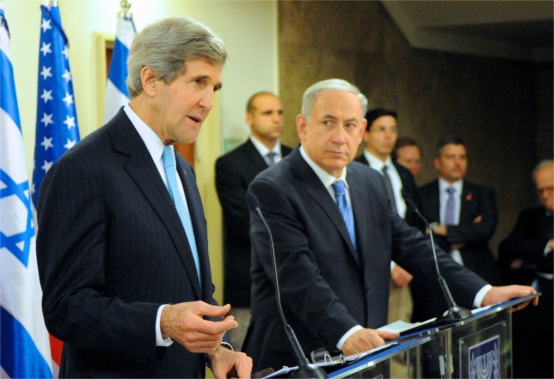Stand Firm, John Kerry
Apr 8 2014 / 8:41 pm
It’s time for the secretary of state to insist on America’s position on Middle East peace.
By Zbigniew Brzezinski, Frank Carlucci, Lee Hamilton, Carla A. Hills, Thomas Pickering and Henry Siegman.
Politico Magazine – Israelis are right to demand that Palestinians recognize the fact of the state of Israel and its legitimacy, which Palestinians in fact did in 1988 and again in 1993. They do not have the right to demand that Palestinians abandon their own national narrative, and the United States should not be party to such a demand. That said, Palestinian recognition of Israel as a Jewish state, provided it grants full and equal rights to its non-Jewish citizens, would not negate the Palestinian national narrative.
Israeli security: The United States has allowed the impression that it supports a version of Israel’s security that entails Israeli control of all of Palestine’s borders and part of its territory, including the Jordan Valley. Many former heads of Israel’s top intelligence agencies, surely among the best informed in the country about the country’s security needs, have rejected this version of Israel’s security. Meir Dagan, a former head of the Mossad, dismissed it as “nothing more than manipulation.”
Israel’s confiscation of what international law has clearly established as others’ territory diminishes its security. Illegal West Bank land grabs only add to the Palestinian and the larger Arab sense of injustice that Israel’s half-century-long occupation has already generated, and fuels a revanchismthat sooner or later will trigger renewed violence. No Palestinian leader could or would ever agree to a peace accord that entails turning over the Jordan Valley to Israeli control, either permanently or for an extended period of time, thus precluding a peace accord that would end Israel’s occupation. The marginal improvement in Israel’s security provided by these expansive Israeli demands can hardly justify the permanent subjugation and disenfranchisement of a people to which Israel refuses to grant citizenship in the Jewish state.
The terms for a peace accord advanced by Netanyahu’s government, whether regarding territory, borders, security, resources, refugees or the location of the Palestinian state’s capital, require compromises of Palestinian territory and sovereignty on the Palestinian side of the June 6, 1967, line. They do not reflect any Israeli compromises, much less the “painful compromises” Netanyahu promised in his May 2011 speech before a joint meeting of Congress. Every one of them is on the Palestinian side of that line. Although Palestinians have conceded fully half of the territory assigned to them in the U.N.’s Partition Plan of 1947, a move Israel’s president, Shimon Peres, has hailed as unprecedented, they are not demanding a single square foot of Israeli territory beyond the June 6, 1967, line.
Netanyahu’s unrelenting efforts to establish equivalence between Israeli and Palestinian demands, insisting that the parties split the difference and that Israel be granted much of its expansive territorial agenda beyond the 78 percent of Palestine it already possesses, are politically and morally unacceptable. The United States should not be party to such efforts, not in Crimea nor in the Palestinian territories.
We do not know what progress the parties made in the current talks prior to their latest interruption, this time over the issue of the release of Palestinian prisoners. We are nevertheless convinced that no matter how far apart the parties may still be, clarity on America’s part regarding the critical moral and political issues in dispute will have a far better chance of bringing the peace talks to a successful conclusion than continued ambiguity or silence.
—–
The co-authors, senior advisers to the U.S./Middle East Project, are, respectively, former national security adviser, former U.S. secretary of defense; former chair of the House Foreign Affairs Committee; former U.S. trade representative; former under secretary of state for political affairs, and president, U.S./Middle East Project.

